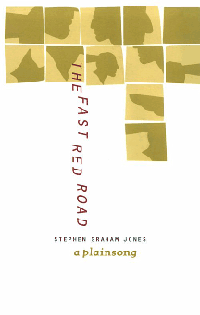The Fast Red Road
This article has multiple issues. Please help or discuss these issues on the talk page. (Learn how and when to remove these template messages)
|
 First Edition Cover | |
| Author | Stephen Graham Jones |
|---|---|
| Cover artist | Jacket design by |
| Country | United States |
| Language | English |
| Genre | Novel |
| Publisher | Fiction Collective 2 |
Publication date | 2000 |
| Media type | Print (Hardcover, Paperback) |
| Pages | 326 pp |
| Followed by | All The Beautiful Sinners |
The Fast Red Road: A Plainsong is a novel by Native American writer Stephen Graham Jones. It was his debut novel, published in 2000.
The novel was originally titled Golius: A Failed Sestina and used as Stephen's dissertation while attending Florida State University. Jones started writing the book after his dissertation director introduced him to Houghton-Mifflin Jane Silver editor at a conference. Jones pitched Silver a book, lying about having already written it. Silver expressed interest in working on the book and asked to see it; Jones started writing it later that day. [1]
Plot summary[]
This article contains content that is written like an advertisement. (September 2021) |
The Fast Red Road—A Plainsong is a gleeful, two-fisted plundering of the myth and pop- culture surrounding the American Indian. It is a novel fueled on pot fumes and blues, a surreal pseudo-Western, in which imitation is the sincerest form of subversion. Indians, cowboys, and outlaws are as changeable as their outfits; horses are traded for Trans-Ams, and men are as likely to strike poses from Gunsmoke as they are from Custer’s last stand. Pidgin, the half-blood protagonist, inhabits a world of illusion—of aliens, ghosts, telekinesis, and water-pistol violence, where TV and porn offer redemption, and the Indian always gets it in the end. His attempts to reconcile the death of his father with five hundred years of colonial myth-making lead him to criss-cross a wasted New Mexico, returning compulsively to his hometown of Clovis, the site of his father’s burial.
Accompanied by car thief Charlie Ward, he evades the cops in a top-down drag race, tearing through barriers “Dukestyle.” The land they travel seems bent with fever—post-apocalyptic —as though the end has arrived and no one noticed. Its occupants hawk bodies and pastel bomb shelters, wandering a bleak hallucination of strip-joints, strip-malls, and all you can eat beef fed beef stalls. They speak a lingo of disposable nicknames, truncated punch lines—slang with an expiration date. Pidgin strays through bar and junkyards, rodeos and carnivals, encountering the remnants of the Goliard tribe. There’s the mysterious Mexican Paiute, Uncle Birdfinger, checkout-girl Stiya 6—the reincarnation of Pidgin’s mother—and media-queen Psychic Sally, who predicts the group’s demise. Each plays a part in the search that will eventually place Pidgin in a position to rewrite history.
Characters[]
- Pidgin
- Charlie Ward
- Uncle Birdfinger
- Stiya 6
- Psychic Sally aka Big Springs Sally
- Patience Patience
- Bonita Bonito
- Cline
- Silky Bird
- "Killer" Tom Black
- [2]
- Atticus Wean
- Weanie The Horse
- Litmus Jones
- Marina Trigo
Awards and nominations[]
The novel won the following awards: Independent Publishers Award for Multicultural Fiction[3]
References[]
- ^ "Interview with Stephen Graham Jones by Amy Patterson".
- ^ A reference to Hal Borland's Tom Black from
- ^ IndependentPublisher.com
External links[]
- 2000 American novels
- Novels by Stephen Graham Jones
- Native American novels
- Novels set in New Mexico
- 2000 debut novels